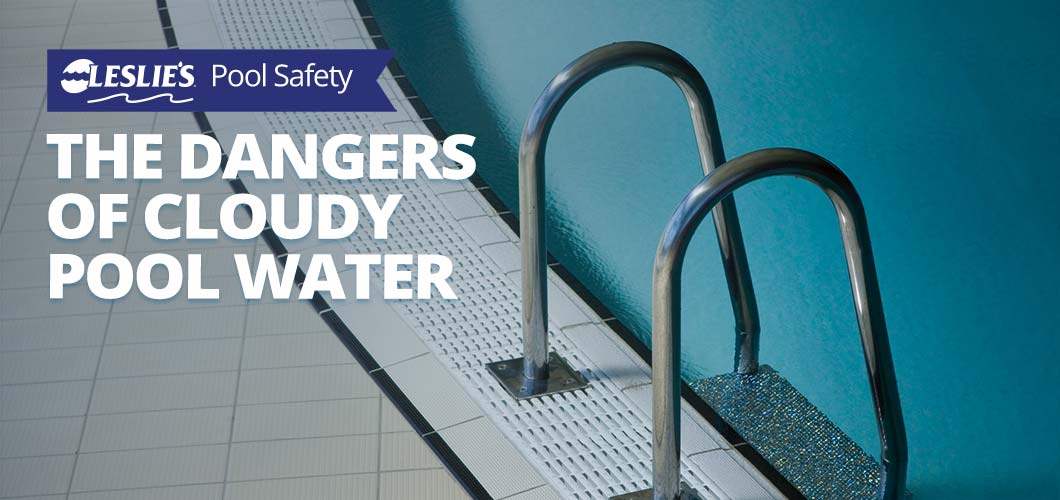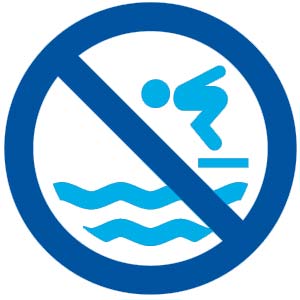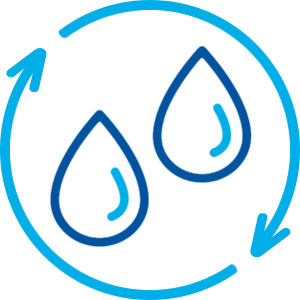
Understanding the Dangers of Cloudy Pool Water
Cloudy pool water can be a big problem for pool owners. Not only is it an eyesore, it’s also a health and safety hazard. Fortunately, it’s usually easy to find the source of the problem and quickly resolve the issue. But if you think it’s OK to swim in cloudy water, think again.
Why is Cloudy Pool Water Dangerous?
It may not seem like a big deal to swim in pool water that's a little murky. The truth is, water that's even a little bit murky or cloudy can hide some pretty nasty surprises, and is not safe for swimming at all. Here are just a few of the reasons you should avoid swimming in cloudy pool water:

Cloudy Pool Water Can Make You Sick

Swimmers Are Hard to See in Cloudy Water

Diving or Jumping Can Cause Injury
If your pool water is not perfectly crystal clear, and you're not able to easily see the bottom of the pool, close the pool to swimming and treat the water right away. Do not allow anyone to get in the pool until the water turns clear again.
Cloudy Pool Water Can Make You Sick
If your pool water is cloudy, it doesn’t necessarily mean the water is unsanitary. But in many cases, cloudy pool water stems from poor filtration and/or water chemistry.
Suspended particles can make it harder for chlorine and other sanitizers to effectively reach all areas of the pool. Excessive particles can also clog up a pool filter, making filtration ineffective. Low chlorine and/or poor filtration allow the growth of bacteria that produce RWI (Recreational Water Illness) or “stomach bugs” in swimmers. Under these conditions, it’s much easier to become infected with germs like Giardia, E-Coli, or Cryptosporidium when contaminated water gets absorbed through the mouth, nose or eyes.
Swimmers Are Hard to See
When a pool is cloudy, it makes it difficult to see when swimmers may be in trouble — especially near the bottom of the pool. Because of this, there have been several drownings in cloudy pools in recent years. It is not recommended to swim in a pool with poor clarity for safety reasons.
Diving or Jumping Can Cause Serious Injury
Being unable to judge the depth of the pool floor is a noticeable side effect of cloudy water, but even the depth of clear water can be easily misjudged. When the floor of the pool is not clearly visible, diving or jumping into the water can be dangerous. In fact, diving is the fourth leading cause of spinal cord injuries.
Causes of Cloudy Pool Water

Poor Water Chemistry
Regular testing and balancing of pool water is so important. Incorrect levels of Free Available Chlorine, pH, Calcium Hardness, Total Alkalinity, and Cyanuric Acid can quickly cloud pool water. Elevated levels of Minerals, Metals, or Total Dissolved Solids may also contribute to cloudy conditions. If the water is balanced, but it’s still cloudy, a shock treatment or clarifier may be needed to help clear the water.
BONUS TIP: Accuracy in pool water testing is key to proper water balance in your pool. Some test strips can be off the mark by as much as 20%, and liquid test kits can also produce bad results from old reagents or vial contamination. For the most accurate and comprehensive view of your pool water balance, bring a sample to your nearest Leslie's store for a free AccuBlue® water test.
Poor Filtration and Circulation

Check that the filter and pump are working properly. Are you using old filter media? Is there a valve bypassing water without being filtered? What about a clogged pump or dirty filter? All of these can contribute to cloudy water problems.
Make sure the pump is running long enough each day. Your pool should have at least one turnover per day, meaning that all the water in the pool passes through the filter at least once. However, two turnovers are needed for many pools to maintain water clarity, especially during hotter weather. Most pools need at least 12 or more hours of filtration daily to compensate for less effective sanitation or filtration.
The pool should also have adequate circulation. Some pools have areas that do not receive much circulation, such as corners and steps. A circular flow pattern is best, aiming the eyeball return fittings in the same direction to push water around the pool. Brushing and vacuuming helps increase circulation, as does using an automatic pool cleaner. Swimming also contributes to better circulation in the pool!
Weather Events and Increased Pool Use

Environmental factors can play a big role in cloudy water. Spring pollen in pools can be an issue, and heavy rainstorms wash in contaminants that quickly cloud pools. In some areas, forest fires, air pollution, or dust and sand storms may be an issue.
In addition, higher water temperatures tend to correspond with higher pool use, and both situations place increased demands on your water balance, sanitizer levels, and pool filtration. For times of increased swimmer use, raise the supply of all three to meet the heightened demand.
How Do I Fix My Cloudy Pool Water Problem?

First, you’ll need to identify the potential cause(s) of your cloudy water woes, and then you'll need to treat the problem. Start with a water test to identify water imbalances. Rebalance the water, and shock the pool if necessary. Clean out the pump and skimmer baskets, and ensure the pool filter media is clean. Remove excess debris from the pool water to keep it from bogging down the filter or using up valuable sanitizer. If you’re still having trouble, add a clarifier, such as Leslie’s Ultra Bright Advanced, and run the pump continuously until the water clears.
For more information about clearing up cloudy pools, check out the video below, or read our blog post, “How to Clear Cloudy Pool Water.” If you’re seeking expert advice, just bring a water sample to your local Leslie’s store for a free AccuBlue water test. You’ll get a precise, comprehensive water chemistry analysis in under 60 seconds, including detailed suggestions for getting your pool water crystal clear again.